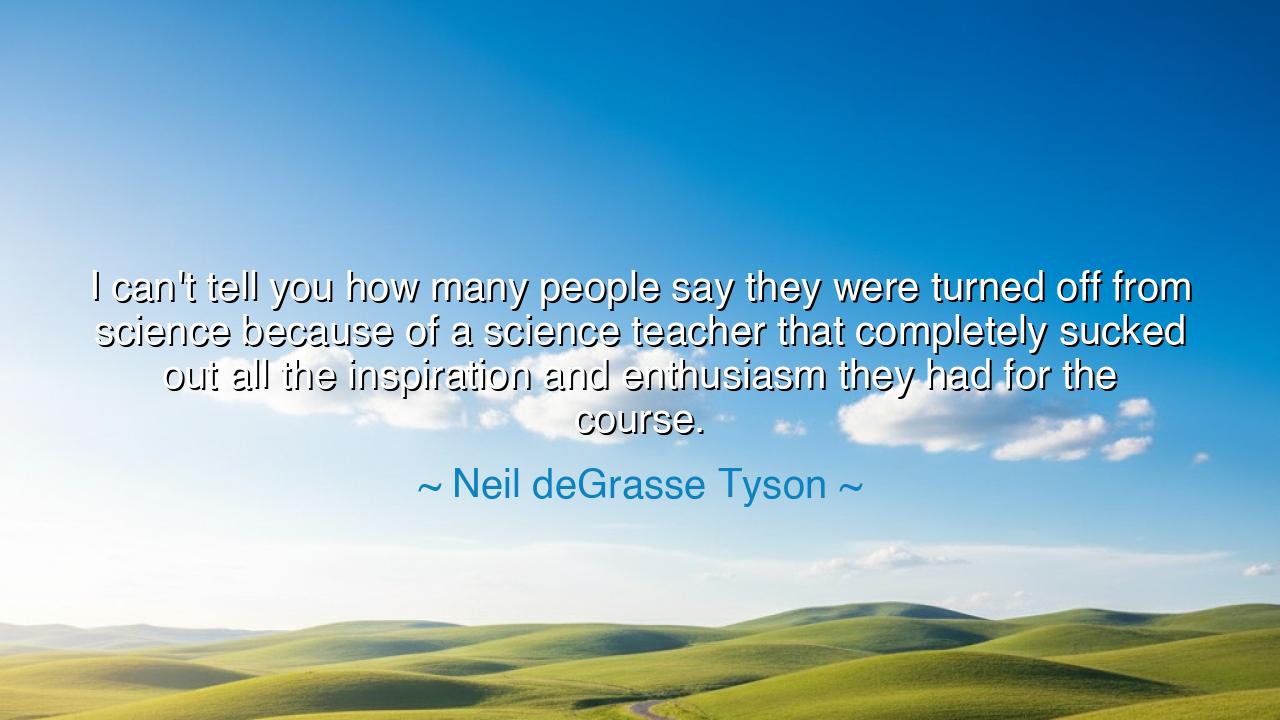
I can't tell you how many people say they were turned off from
I can't tell you how many people say they were turned off from science because of a science teacher that completely sucked out all the inspiration and enthusiasm they had for the course.






Hear, O Seekers of Wisdom, the words of Neil deGrasse Tyson, who, with insight and clarity, speaks of the immense responsibility that lies with those who teach the science of the world. "I can't tell you how many people say they were turned off from science because of a science teacher that completely sucked out all the inspiration and enthusiasm they had for the course." In these words, Tyson touches upon a profound truth—the power of a teacher to either ignite the flame of curiosity or, sadly, extinguish it. The pursuit of knowledge, especially in the realm of science, requires more than just facts and formulas. It requires passion, enthusiasm, and the ability to inspire the hearts and minds of those who seek to understand the world around them.
In the ancient world, the role of the teacher was revered as one of the highest callings. Socrates was not just a master of philosophy, but a master of the art of questioning, whose very method sparked curiosity and critical thinking in the hearts of his students. His teachings were not about merely transmitting knowledge but about igniting a fire in his students, urging them to seek truth for themselves. Socrates did not lecture in the traditional sense; he engaged in dialogue, asking probing questions that led his students to discover answers, to think for themselves, and to be inspired by the mysteries of the world. In this, Socrates understood the power of inspiration, for it is the heart of learning, the driving force that propels one to continue seeking, exploring, and understanding.
Yet, as Tyson rightly observes, there are those who, through lack of passion or understanding, fail to inspire and, instead, cast a shadow over the subject they teach. Plato, a student of Socrates, also saw the importance of inspiring minds in his works, especially in The Republic, where he describes the philosopher-kings who must be imbued with both wisdom and compassion in order to lead. A teacher who lacks these qualities—who does not approach their subject with enthusiasm—can lead their students astray, leaving them to wander in the darkness of disinterest and boredom. In the case of science, such a teacher can turn the wonders of the natural world into a cold, mechanical exercise, devoid of the awe and curiosity that should fuel the pursuit of understanding.
Consider, O Seekers, the story of Albert Einstein, whose passion for physics was contagious, and whose deep sense of wonder at the mysteries of the universe inspired generations of scientists to follow in his footsteps. Einstein, from a young age, was not simply interested in equations and theories; he was mesmerized by the very nature of reality. He viewed the universe not as a collection of abstract problems but as a grand puzzle waiting to be solved, each discovery leading to new questions, new insights. His teachers, in turn, inspired him to approach the mysteries of science not with cold precision, but with the same awe and enthusiasm that he carried in his heart. In his own life and work, Einstein embodied the very essence of Tyson’s message: the power of a teacher to inspire enthusiasm and the importance of approaching science with passion.
Tyson’s critique is not just a commentary on poor teaching but a call to all educators to recognize the profound impact they have on the hearts and minds of their students. It is not enough to impart knowledge; teachers must inspire students to embrace learning as a lifelong journey, to see the pursuit of science as an adventure rather than a mere requirement. In the realm of science, every student should feel the thrill of discovery, the joy of understanding, and the wonder that comes with each new insight into the nature of the world. Without inspiration, learning becomes a dry, mechanical task—a process devoid of meaning or purpose.
The lesson, O Seekers, is that knowledge is not a gift that is freely given without effort; it must be nurtured, cultivated, and inspired. We all carry within us the potential to understand the world, but it is through the teachers we encounter that we come to realize that potential. A good teacher is not just an instructor but a guide, a motivator, and a source of inspiration. The greatest teachers are those who do not merely share facts, but who make their students fall in love with the subject, who awaken a sense of wonder and a desire to seek truth. Just as Socrates inspired his students to question, so too should we seek to inspire those around us to ask the great questions of life, to approach science and the world with curiosity and enthusiasm.
So, O Seekers, let the words of Tyson serve as a reminder that learning is not merely about acquiring information but about cultivating a sense of wonder and enthusiasm for the world. Whether you are a student or a teacher, recognize the power of inspiration—it is the fuel that drives the pursuit of knowledge. Seek to learn with passion, to teach with zeal, and to share the awe you feel for the natural world with others. Only through inspiration can we transform the mysteries of the universe into a never-ending journey of discovery. Let the pursuit of knowledge be a path not of dull obligation, but of joyous curiosity, where every question leads to a new insight, and every answer opens the door to more wonder.






AAdministratorAdministrator
Welcome, honored guests. Please leave a comment, we will respond soon